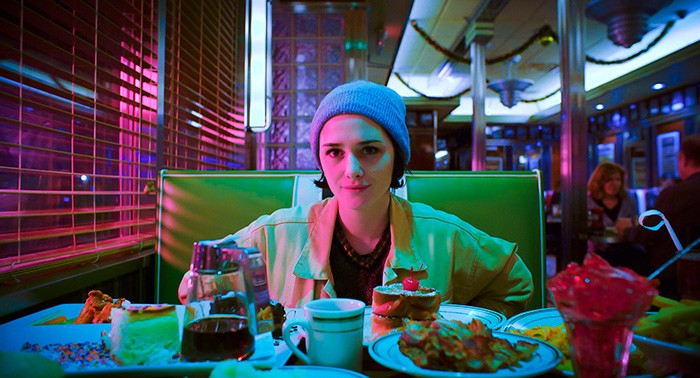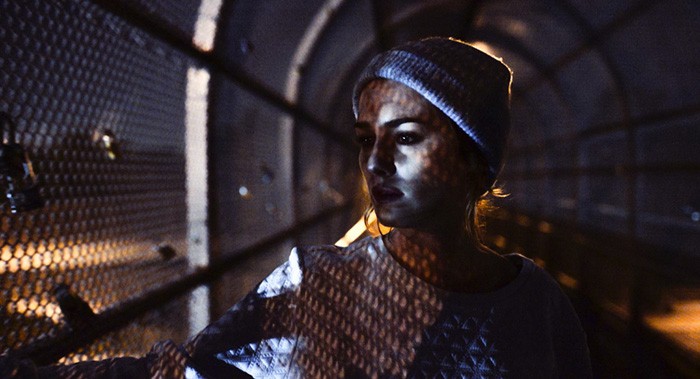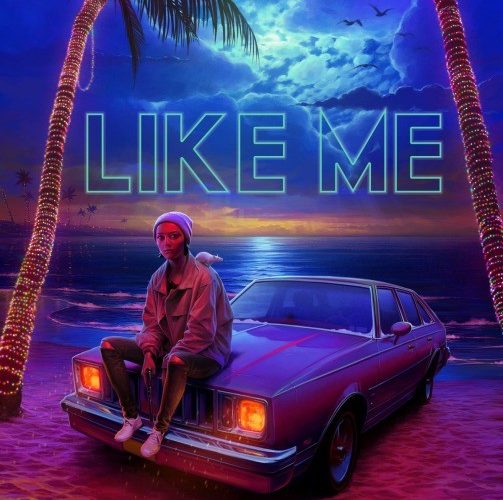While it may do a better job at depicting the nihilistic depravity of living through social media at the detriment of “real life” than Ingrid Goes West, Robert Mockler’s Like Me still fails to capture the psychological prison this artificial life creates beyond its surface chaos. We watch Kiya (Addison Timlin) with a voyeuristic relish much like the viewers of her YouTube page—craving insanity as though it’s all an act because it very well could be exactly that. What we watch online isn’t inherently “real.” There isn’t some contract that says “Celebrity A” actually uses “Product B” and isn’t being paid to pretend. There’s no disclaimer stating if a video is staged because not knowing is part of its appeal. But what does this say about us?
That’s the question many cinematic attempts at portraying this blurring of artificial and authentic haven’t answered. And while re-creations of the atmosphere and setting of such scenarios might bring us closer to figuring out our own personal answers, it’s tough to supply credit when access to the real thing is so easy. This is why I’m Still Here failed. Anyone who is interested in this notion that we as humans can devolve on a public stage has already delved into the phenomenon by watching it in real time. While Casey Affleck’s faux documentary might be profound on its own, I couldn’t view it without the baggage of having already seen the footage of Joaquin Phoenix’s “breakdown” via a duped media’s lens. Hindsight renders the effect’s immediacy moot.

So while it can be fun to see Kiya do crazy things while wrongly justifying them as demands of the world at-large, the line between Mockler presenting her actions as a lesson to be learned and just another display of anarchy without rhyme or reason is impossibly thin. Are we a part of the masses egging her on, removed from the consequences in a way that allows our consciences to ignore guilt when something goes wrong? Or are we the detractors grimacing at what we see despite constantly going back, adding to her views and thus her motivation all while filming response videos that prove we’re as narcissistic as she? This entire dynamic is lose-lose for everyone involved because the makers and viewers are complicit regardless of proximity.
Mockler gets this part right by creating an adversary for Kiya in the form of Burt (Ian Nelson)—a pedantic commentator who wields monologues the same way she does violence. He’s triggering people with his words, demanding that they feel something whether it’s agreement or dissent. He doesn’t want a middle ground because this life in pixels is built upon extremes. Burt’s product is confident, matter-of-fact revulsion and he sells it on the heels of Kiya’s lack of boundaries. As she scares someone into peeing his pants at gunpoint, he chastises those who watch all while craving to be watched as well. We are experiencing performances. It’s the no-holds-barred woman feigning feminist altruism and the chauvinistic man-splaining troll vomiting vitriol locked in a circuitous war without end.

They want “likes,” popularity, and affirmation. And the consequence is discovering that they have inevitably become the persona they’ve cultivated. They’ve removed themselves from reality, fracturing new and old relationships into a series of transactions. Freddie the convenience store clerk (Jeremy Gardner) isn’t anything more than a prop to Kiya, something to be used, abused, and discarded—a product she has bought and sold to the world’s basest desires. The same goes with a vagrant for whom she promises pancakes in exchange for a story. The same goes for motel owner Marshall (Larry Fessenden) and the prospect of sex more or less giving her ownership over his existence. Everything has a cost and there’s always someone willing to squeeze you further than you’re willing to squeeze him/her back.
This is what Like Me provides: escalation. But it tries to accomplish a sense of sympathy too. Timlin provides Kiya a complexity that ultimately hurts our ability to accept what’s happening rather than pity her. She gives pause often, questioning her actions and whether she should go further. But she never gives us reason to believe she might stop because the film works hard to ensure we know she has no limits. Mockler infuses wild segues of hyper-speed strobe imagery pulsing with color, kinetic energy, and gummies and liquids chewed, spit, and swallowed to amp up our adrenaline and prepare us for what Kiya does next. To get that engine roaring only to then show her sadness when a phone call (home?) constantly goes unanswered is extremely frustrating.

The whole feels hollow. It plays with stereotypes (the underestimated proving their mettle and the brazen proving their cowardice) that we laugh at, but doesn’t quite give them life beyond labels. It feeds innocent and guilty alike to a young woman in a constant state of pushing herself over the edge, simultaneously painting them as opportunists and victims to the point of our being unsure who is to blame: them or Kiya? Mockler is presenting a world where no one is safe, where pranks and crime are synonymous and the police have better things to do. So we begin policing ourselves. We play judge, jury, and executioner behind anonymous firewalls until morality is sacrificed for fake justice through entertainment. He delivers a mirror of which we’re already aware.
It will ultimately prove divisive with formal flourishes that demand our attention despite its substance being too thin to support the lofty ambition. Timlin and Fessenden are great with the latter giving her character the unexpected at every turn. Their dynamic evolves in a way that creates much-needed ambiguity, but it again can’t quite live up to its potential. The same can be said about Burt because his position as a foil had so much promise. I liked how he was put there as a stand-in for our own backhanded complicity to this culture and his overt slam of Twitter and others for refusing to enforce rules that would hurt their prolific and dangerous users. Instead of grounding things, though, he’s just another piece in Kiya’s game.
Like Me is now on VOD/Digital.

